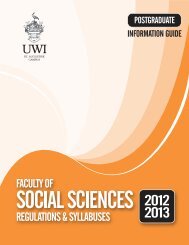Faculty of Humanities and Education (Postgraduate) - The University ...
Faculty of Humanities and Education (Postgraduate) - The University ...
Faculty of Humanities and Education (Postgraduate) - The University ...
Create successful ePaper yourself
Turn your PDF publications into a flip-book with our unique Google optimized e-Paper software.
76<br />
POSTGRADUATE REGULATIONS & SYLLABUSES 2012 - 2013<br />
THE FACULTY OF HUMANITIES & EDUCATION<br />
CONTENT<br />
• Definition <strong>of</strong> health, philosophy, <strong>and</strong> scope <strong>of</strong> HFLE in<br />
relation to the aims <strong>of</strong> education<br />
• Definitions <strong>of</strong> family, role <strong>of</strong> family in socialization <strong>and</strong><br />
transmission <strong>of</strong> culture, gender roles <strong>and</strong> expectations<br />
in family <strong>and</strong> society, aspects <strong>of</strong> family law, e.g., rights <strong>of</strong><br />
children, property rights, maintenance <strong>and</strong> custody, etc.<br />
• Effect <strong>of</strong> religion,tradition,ethnicity,SES,myths <strong>and</strong> taboos<br />
on family lifestyle, lifestyle diseases like diabetes, cancer<br />
<strong>and</strong> hypertension, definitions <strong>of</strong> values <strong>and</strong> morals, factors<br />
affecting adolescent decision-making about ethical issues,<br />
e.g., family, peer group, religion, social norms, etc.<br />
• Identification <strong>and</strong> analysis <strong>of</strong> demographic trends <strong>and</strong><br />
their effects on families; social <strong>and</strong> ethical implications<br />
<strong>of</strong> reproductive technologies, <strong>and</strong> such related issues<br />
as fertility management, in-vitro fertilization, surrogate<br />
motherhood, etc.,<br />
• Goals <strong>of</strong> counselling, teacher as counsellor sources <strong>of</strong> help<br />
for adolescents, counselling skills, e.g., listening, perception<br />
checking, clarifying, etc.<br />
• Family crises involving adolescents, the situations that give<br />
rise to them, coping strategies, conflict resolution skills,<br />
intervention steps, identification <strong>of</strong> support systems<br />
• Self-awareness,reflection,<strong>and</strong> ethical appraisal <strong>of</strong> personal<br />
value systems with respect to health <strong>and</strong> family life<br />
• Self in relation to others, underst<strong>and</strong>ing intimacy<br />
• teachingstrategiesforaffectiveoutcomes,use<strong>of</strong>alternative<br />
Assessment strategies in HFLE<br />
Delivery Mode<br />
Case-study, role-play, lecture/discussion, <strong>and</strong> other interactive<br />
strategies.<br />
ASSESSMENT<br />
A Foundation Areas essay <strong>of</strong> 3,000 words.<br />
REFERENCES<br />
Barrow, C. (1996). Family in the Caribbean: <strong>The</strong>mes <strong>and</strong> perspectives.<br />
Kingston, Jamaica: Ian R<strong>and</strong>le.<br />
Birch, D. A. (1994). Examining ethical issues in health education:<br />
activities for pr<strong>of</strong>essional preparation. Journal <strong>of</strong> Health<br />
<strong>Education</strong>, 25(2), 121-123.<br />
Brock, G. (1993). Ethical guidelines for the practice <strong>of</strong> family life<br />
education. Family Relations, 42(2), 124-127.<br />
Bruce, J., Lloyd, C.B., & Lennard, A. (1995). Families in Focus. New<br />
perspectives on mothers, fathers <strong>and</strong> children. New York:<br />
Population Council.<br />
Dipch<strong>and</strong>, N. (1986). Family life education: From theory to practice.<br />
Unpublished DipEd dissertation, <strong>The</strong> <strong>University</strong> <strong>of</strong> the<br />
West Indies, St. Augustine.<br />
Ford, D. (1990). <strong>The</strong> need for the implementation <strong>of</strong> the family life<br />
education programme in secondary schools in Trinidad &<br />
Tobago. Unpublished DipEd dissertation, <strong>The</strong> <strong>University</strong><br />
<strong>of</strong> the West Indies, St. Augustine.<br />
Leonard, D., & Hood-Williams, J. (1988). Families. London:<br />
Macmillan <strong>Education</strong>.<br />
Robertson, E. (1987). Caribbean family life: A practical guide.<br />
Cambridge: CUP.<br />
Trinidad <strong>and</strong> Tobago. Ministry <strong>of</strong> <strong>Education</strong>. (1988). Primary<br />
school syllabus: Social studies <strong>and</strong> family life education.<br />
Port <strong>of</strong> Spain, Trinidad: Government Printery.<br />
UNICEF. (1995). Strategy for strengthening health <strong>and</strong> family<br />
life education in CARICOM member states. Bridgetown,<br />
Barbados: UNICEF Caribbean Area Office.<br />
UNICEF. (1997). Situation analysis <strong>of</strong> children <strong>and</strong> their families:<br />
Trinidad & Tobago. Bridgetown, Barbados: UNICEF<br />
Caribbean Area Office.<br />
Zeidenstein, S., & Moore, K. (Eds.). (1996). Learning about sexuality:<br />
A practical beginning. New York: Population Council.<br />
COURSE DESCRIPTIONS<br />
SEMESTER:<br />
COURSE CODE: EDRS 5220<br />
COURSE TITLE: PROJECT IN THE THEORY OF EDUCATION<br />
NUMBER OF CREDITS: 5<br />
COURSE DESCRIPTION: This course is intended to contribute<br />
to the pr<strong>of</strong>essional development <strong>of</strong> teachers by sensitizing<br />
them to contemporary local, regional, or international issues<br />
which impact directly or indirectly on their practice <strong>of</strong><br />
education. Students will be expected to apply concepts from<br />
the Foundations <strong>and</strong> the Curriculum in scholarly explorations<br />
<strong>of</strong> these issues. <strong>The</strong> course will be delivered in a variety <strong>of</strong><br />
presentation formats, such as student presentations, guest<br />
lectures, film or video viewing, panel discussions, workshops, etc.<br />
<strong>The</strong> selection <strong>of</strong> issues to be explored in any year will be based<br />
on students’ identified interests <strong>and</strong> other issues in education<br />
deemed to be current <strong>and</strong> relevant.<br />
ASSESSMENT<br />
A dissertation (5,000 words) – 100%<br />
<strong>The</strong> dissertation will allow students to respond in ways that<br />
are expressive <strong>of</strong> their unique underst<strong>and</strong>ing <strong>of</strong> the issues <strong>and</strong><br />
<strong>of</strong> their preferred modes <strong>of</strong> representation. <strong>The</strong> dissertation<br />
should be reflective <strong>of</strong> wide reading <strong>and</strong> should include a<br />
written analysis <strong>of</strong> the issue under study. Students will be<br />
closely supervised by assigned tutors for the preparation <strong>of</strong> this<br />
assignment.<br />
SEMESTER:<br />
COURSE CODE: EDAR 6030<br />
COURSE TITLE: PROJECT IN VISUAL AND PERFORMING ARTS<br />
NUMBER OF CREDITS: 5<br />
COURSE DESCRIPTION: <strong>The</strong> project is intended to further the<br />
development <strong>of</strong> artistic skills <strong>and</strong> experiences as fundamental<br />
to the all-round effective functioning.<br />
ASSESSMENT<br />
<strong>The</strong> Project in Visual <strong>and</strong> Performing Arts Is composed <strong>of</strong> two<br />
components:<br />
• <strong>The</strong> Integrated Arts Project 70%<br />
• <strong>The</strong> Arts Elective 30%

















